Dumisile Ndlovu, Mooi River coordinator:
“The people in my area know my work, and that where there is a case of domestic violence my methods often involve the police and arrest of the perpetrator."
Background
Domestic violence is the most common type of case dealt with by coordinators, making up 38%, or 2157 cases out of 5749, in 2011. Defined as emotional, verbal and economic as well as physical abuse, domestic violence cases have remained consistently high in number over the last five years.
Staff advise victims of their rights and possible courses of action and encourage them to report abuse the first time it occurs. Many victims and abusers are not even aware of how domestic violence is defined and prohibited.
 Victims frequently don’t want to take legal action and in half of cases prefer to try to resolve the problem by mediation, often because they willing to give the abuser a second chance.
Victims frequently don’t want to take legal action and in half of cases prefer to try to resolve the problem by mediation, often because they willing to give the abuser a second chance.
In these instances coordinators insist on counselling both parties and advise them on how to resolve future conflicts, trying to preserve and rebuild family relations as much as possible. Two thirds of mediations for domestic violence produce long-lasting improvements in the relationship.
This process includes educating men in their responsibility and the legal consequences if they continue the abuse. If the coordinator thinks the abuser will not change his behaviour, she encourages the client to obtain a protection order or lay a charge. Many victims prefer this course of action, and some decide to leave the relationship after discussing it with the coordinators.
When addressing the legal rights of an individual, coordinators deal with underlying social issues: with domestic violence these are poverty, HIV/AIDS, unemployment, alcohol abuse, maintenance, the abusers’ experience of being abused as a child, and patriarchal values that devalue women.
 In the past, women were expected to endure physical abuse and were at the mercy of communities that shun women who leave their husbands. Another constraint was that domestic violence was regarded as a family affair not to be spoken of to other people.
In the past, women were expected to endure physical abuse and were at the mercy of communities that shun women who leave their husbands. Another constraint was that domestic violence was regarded as a family affair not to be spoken of to other people.
In many cases where women could no longer endure the abuse they ran away and went back to their family homes. The husband would then fetch his wife without any resistance from her family, take her back to the marital home and continue the abuse. Many women were so brutally assaulted that they died of their injuries or were maimed for life.
(Left) CCJ produces flyers in English and Zulu, with cartoons to illustrate different laws. “The trust that people have in me is overwhelming. They come here first, even before the clinic or welfare office” – Zandile Khanyile, New Hanover coordinator |
Sonto Nene, Aug 2010:
Husband Mends his Ways
There was a married couple and the man was abusing the woman by cheating on her and spending his money on girlfriends. One of them became pregnant.
I invited th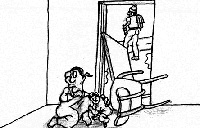 em both for mediation and the man was very apologetic. He said he hadn’t realised that he had been hurting his wife and he apologised to her. Even the girlfriend apologised to her. After that the husband changed his behaviour. I have done follow-ups and spoken to the wife and she says everything is fine now.
em both for mediation and the man was very apologetic. He said he hadn’t realised that he had been hurting his wife and he apologised to her. Even the girlfriend apologised to her. After that the husband changed his behaviour. I have done follow-ups and spoken to the wife and she says everything is fine now.
Nokuthula Mchunu, June 2008:
Protection Order Helps Rebuild a Relationship
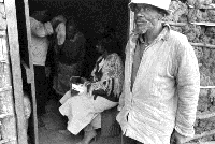
There was a man who was my enemy because I had assisted his wife to apply for a protection order and lay a charge of assault; he said he hated me, his wife and his mother.
One day he stopped and he gave me a lift in his car. His wife was in the car with him and they were both happy to speak to me. They would not let me pay for the transport. They said that I do not have to pay because I help the community.
“Now that my husband knows that everyone is protected by the Domestic Violence Act, his behaviour has changed and there is peace at home.’
– Respondent, 2009 monitoring visits
|
Sibongile Mchunu, Aug 2010:
Husband Refuses to use Contraception
A woman was married to a man who was cheating on her and was well-known as a womaniser. He wouldn’t wear a condom and because of this she refused to sleep with him. She asked me for advice and I told her that it was her legal right to say no to sex because her life was in danger.
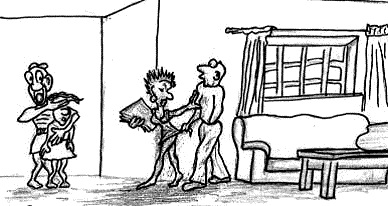
I called them both to mediation and told them about the risk of HIV/AIDS. The man was furious and felt that we women were ganging up on him. Then I threatened to take out a protection order and gave the wife advice about a divorce. At this point the man apologised and said he would use a condom in the future. The couple are still together today and everything is okay.
Nonhlanhla Ndlela, July 2008:
Domestic Violence – Issuing a Protection Order

A 34-year-old unmarried woman came to report that she had been in love with a certain man and that they had a 6-year-old child. She had ended the relationship four months ago. Everything had been fine until her former lover had assaulted her on her way from work. She had been rescued by the police, but the abuser had not been arrested. On the same day at midnight, the abuser had come to her home and kicked the doors and threatened to kill her again. The police had intervened. She needed help with this matter.
(Left) Some clients choose a protection order instead of mediation
I advised the client about mediation and protection orders and how each of them worked. She said that she would prefer a protection order. I issued the protection order and the client was referred to the Magistrate's Court. The protection order was finalised and the client was very happy with the assistance that she received.
‘When men see me at their homes they think , “What have we done?” Most males in the area are scared of me!” - Coordinator Dumusile Ndlovu |
Sibongile Masondo, Sept – Oct 2008: Empowered Woman Leaves Abusive Partner
A 50 year old woman came to the office and reported that she was being abused by her 57 year old partner. He was abusing her verbally, emotionally and physically. They met in September 2007 and broke up twice because there was no happiness in the relationship. This man did not trust her and called her names. He threatened to burn her with boiling water. On one day he actually boiled water with which to burn her.
My client said that her weak point was that she loved this man and that she therefore did not want to lose him. She was afraid of him because he said that he was going to kill he r.
r.
I counselled my client because she was confused and wanted my advice. I advised my client to take a firm decision because she was telling me that if she stayed with this man she was going to die: her life was in danger according to her own words. I advised her about the protection order.
Mediation was arranged and both parties came. The client’s partner denied some of the things but acknowledged that he threatened to burn her with boiling water. He said that it was only a threat. My client was crying and asked why she must die for nothing. He tried to apologise. I gave advice to both parties.
My client made a decision to get out of this relationship and asked her abuser not to beg her to stay with him. The client’s partner asked her to give him another chance but she said that she had given him a chance twice before, but that he had blown it on both occasions.
My client appreciated my assistance and advice and said that she was relieved about making the decision to end the relationship after discussing the problem with me.
Information: Frequently clients consult the coordinators to confirm a decision that they have already made but do not have the confidence to act on, as was the case of the client who knew that her abusive partner would not stop his behaviour and that a continued relationship with him was likely to end in further injury.
| Coordinator Bazamile Magubane: “I would change the customary law of lobola. I feel domestic violence is started by lobola. Men think they can rule and control their wives as a result of having paid lobola.” |
Sonto Nene, May-June 2008:
Physical Abuse, Humiliation, Demand for Child Care Grant
An unmarried female aged 29 came to report that her partner arrives home drunk, wakes her up and demands warm food. He also tells her to wash his feet in the middle of the night and demands the child support grant money, saying that he needs his share because they are his children. She also said that he had chased her out of the house. When she refused to give him money or to wash his feet, he insulted her, calling her a bitch and a dog. Sometimes he assaulted her physically. She reported all this to her in-laws but they sided with him.
I provided counselling and told the client about mediation and protection orders. A letter of invitation was issued to the client’s partner. The police helped the  client to forward the letter to her partner.
client to forward the letter to her partner.
Both parties came to the office on 16 May 2008. I gave them each a chance to state their problems. The partner was cooperative and admitted that the client was telling the truth but he denied chasing her out of the house. He said that the client never complained about washing his feet when he comes home at night. He apologised to her and said that he did not realize that he was abusing her.
The client told her partner that she wants her clothes and her baby because she needs to go back to her family. He agreed. The client accepted his apology but she told him that she is going back to her family anyway. He accepted that.
| Background: A case reported in 2007 illustrates the patriarchal view of marriage: a physically abused woman was so desperate that she confided in her mother. The mother told her that she had married for better or for worse and that “this is the worse”. |
Nonhlanhla Ndlela, Mar-April 2008:
Domestic Violence relating to Maintenance and Drinking Problems
A 35 year old woman from Shayamoya squatter camp reported that she is being assaulted by her partner of 15 years. They have three children; she is pregnant again and her partner does not maintain the children.
I advised the client of her options and she chose mediation for both issues.
 During the mediation it was revealed that both parties have a drinking problem and they fight in front of the children. The eldest child has left to stay with other relatives. Both parties were advised not to fight again and the partner agreed to pay R400 a month in maintenance. The client will buy the groceries and bring the till slips to the support centre to prove that she has.
During the mediation it was revealed that both parties have a drinking problem and they fight in front of the children. The eldest child has left to stay with other relatives. Both parties were advised not to fight again and the partner agreed to pay R400 a month in maintenance. The client will buy the groceries and bring the till slips to the support centre to prove that she has.
I advised the client to obtain an ID document and birth certificates for the children so that she can apply for grants for the children because her partner is earning very little money.
| “I was an abused woman and started believing I deserved it. Then one day I attended one of the workshops and I was told that what my husband was doing was wrong…. I visited the Centre. Now things have changed, I am happy in my house, I feel like a real woman.” – Respondent, 2006 Impact Study |
Sonto Nene, July-Aug 2008:
Relationship Difficulties: An Empowered Woman Refusing to Stay with an Abusive Husband
A 42 year old woman came to the office because she was not happily married, the reason being that her husband is a womaniser even though they have been married for 21 years. He is untrustworthy because he is secretly preparing to marry a second wife. His family gives him support in whatever he is doing. He also had an affair with another woman by whom he has a child.
My client’s in-laws turned against her and eventually she did not enjoy being a wife. The worst part of it is that they are no longer sleeping together as husband and wife. Why? Because he has moved out of their bedroom.
The client’s husband bought a plot of land claiming it was so that he could keep goats and build two rooms for the shepherd. In reality he was staying with another woman because his wife had caught him red handed.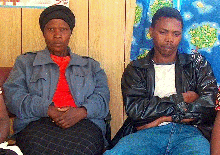
I counselled her and explained to her that the mediation process works well. She agreed to go through the process. Both parties came to the office and each was given an opportunity to explain their cases. The client repeated the facts she had given me and stated that as far as she was concerned, the marriage was over.
According to the husband everything that his wife said was news to him. He said he loves his wife and he is prepared to do anything for her. He did not show any signs of being sorry. Eventually he apologised, but she was so angry that all she wanted to know was how the divorce process worked. I explained it to them but advised them to first think about it carefully.
I telephoned the client to find out how they were coping. She told me that she had already moved out. She told me that she had failed completely to stomach his nonsense. She also told me that she is receiving quite a number of calls from her husband, demanding to know her whereabouts and all she says to him is: “Over my dead body”.
“In the community of Potshini, women did not know that they are not expected to tolerate physical abuse from their spouse." - Respondent, 2007 Impact Study
Dudu Basi, March 2008: Domestic Abuse and Maintenan ce
ce
This case was reported by the Evatt Station Commissioner on 4 March 2008. On 5 March I visited the place, a very deep rural area. The client reported that she has been abused economically, verbally and financially for years. She reported the case to the social workers at Hlanganani in Bulwer but she did not get help. She said that the social workers promised to talk to her husband but they did not. This year the client turned to Evatt Police Station to report the abuse and was referred to us.
Mediation was organised on the same day. The respondent’s employer was contacted and he promised to provide the respondent with transport to Evatt Police Station.
It was clear during the mediation that the respondent does not know about his wife’s rights. He was rude when I asked him some questions. I discovered that he has another woman who is staying with him at his workplace. He said that he would never trust his wife again because she had reported him to a stranger instead of to his family. The client explained that she had reported the matter to his family three times but that he does not listen to his family.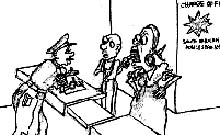
At the end of the mediation the respondent chose not to stay with his wife anymore but to stay with his lover at work. It was agreed that he will pay R500 a month for maintenance. I suggested that the money should be paid to the Station Commissioner at Evatt because Himeville Police Station is too far for the client.
R500 was collected by the client at the end of March 2008. Another R500 was deposited by the respondent, in their son’s account. He is at school in Cape Town.
July-Aug 2008, by Dumisile Ndlovu:
Using the Threat of Arrest to Stop Abuse
I solved a number of domestic violence cases without mediation. What I did was to get a report from my client and then send the c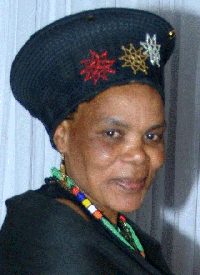 lient to tell the abuser that she had come to me for advice and that it could happen that there would be mediation. I then wait for two days.
lient to tell the abuser that she had come to me for advice and that it could happen that there would be mediation. I then wait for two days.
(Left) Coordinator Dumisile Ndlovu has a novel way of dealing with domestic violence
The client then comes back to report that the abuser has changed and that he asked the client to come and report that everything is fine. I always ask the client to speak the truth because I have a fear that the abuser has threatened her and made her tell me that everything is fine, but even the neighbours of the client come to report that I have helped the client and that everything is fine. In one case the abuser’s brother advised him and told him the consequences of his abuse and that case was also successfully resolved without mediation.
The people in my area know my work, and that where there is a case of domestic violence my methods involve the police and arrest of the perpetrator. Most males in the area are scared of me.